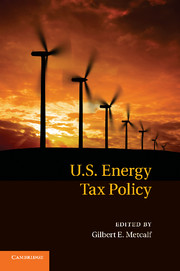Book contents
- Frontmatter
- Contents
- Conference Participants
- 1 Introduction
- 2 Distributional Impacts of Carbon Pricing Policies in the Electricity Sector
- Comments
- Comments
- 3 Distributional Impacts of a U.S. Greenhouse Gas Policy
- 4 Instrument Choice Is Instrument Design
- 5 Taxes, Permits, and Climate Change
- 6 Border Adjustments for Carbon Taxes and the Cost of Emissions Permits
- 7 Taxes and Caps as Climate Policy Instruments with Domestic and Imported Fuels
- 8 How Much Should Highway Fuels Be Taxed?
- 9 State Tax Policy and Oil Production
- 10 The Social Costs and Benefits of U.S. Biofuel Policies with Preexisting Distortions
- Index
- References
Comments
Published online by Cambridge University Press: 01 June 2011
- Frontmatter
- Contents
- Conference Participants
- 1 Introduction
- 2 Distributional Impacts of Carbon Pricing Policies in the Electricity Sector
- Comments
- Comments
- 3 Distributional Impacts of a U.S. Greenhouse Gas Policy
- 4 Instrument Choice Is Instrument Design
- 5 Taxes, Permits, and Climate Change
- 6 Border Adjustments for Carbon Taxes and the Cost of Emissions Permits
- 7 Taxes and Caps as Climate Policy Instruments with Domestic and Imported Fuels
- 8 How Much Should Highway Fuels Be Taxed?
- 9 State Tax Policy and Oil Production
- 10 The Social Costs and Benefits of U.S. Biofuel Policies with Preexisting Distortions
- Index
- References
Summary
It is a joy to read and comment on a chapter like this one, written by Dallas Burtraw, Margaret Walls, and Joshua Blonz. They use comprehensive data and modeling to account for many complications in their major effort to measure the effects on ten different income groups from the way in which a cap-and-trade climate policy like the Waxman-Markey bill that passed the U.S. House of Representatives is likely to raise the price of electricity and generate value from permits that may be distributed to households. The result is well written, clear, and convincing. In particular, they employ 82,000 household observations from the Consumer Expenditure Survey from 2004 to 2006, allocate those households into ten annual income deciles, and calculate the expenditure on electricity of each group. Then they use the “Haiku model,” which includes specific differences in electricity pricing regulation in twenty-one different regions of the United States, “accounting for price-sensitive demand, electricity transmission between regions, system operation for three seasons of the year…and four times of day, and changes in capacity investment and retirement over a 25-year horizon.”
Effects would be proportional if all groups spent their income in the same proportions, but the data show that the poorest group spends ten percent of their income on electricity, whereas the richest group spends only 1.2 percent of income on electricity; hence, the effects are regressive. The main question addressed, however, is about the effects of alternative uses of the permit value to help low-income families.
- Type
- Chapter
- Information
- US Energy Tax Policy , pp. 41 - 45Publisher: Cambridge University PressPrint publication year: 2010



